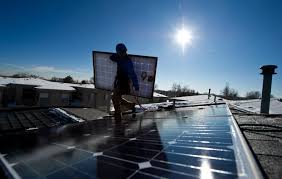Time out! Minnesota city passes moratorium on solar craze

By Tom Steward | Watchdog Minnesota Bureau
MONTICELLO, Minn. — The future is bright for solar power in Minnesota, thanks to a slew of subsidies toward requiring big utilities to generate 1.5 percent of their power from solar by 2020.
Despite a rush by some cities to get on the bandwagon, Monticello was the first municipality in the state to impose at least a temporary moratorium prohibiting installations to generate solar power.
“Given this emerging technology, it would be wise for the city to be proactive and take the opportunity to understand this issue for development and for regulations,” said Angela Schumann, Monticello community development director in recommending the moratorium to the City Council on Nov. 24.
The interim ordinance slaps a year-long ban on applications or the issuance of city permits for the principal use of property for solar energy generation.
“Right in the middle of town, we could have a huge solar farm, which probably isn’t in the best interest of the city to have that there as opposed to a business,” said Monticello Mayor Clint Herbst.
The moratorium idea surfaced as City Hall began receiving anonymous exploratory inquiries about the availability of land within and just outside the city limits.
“They usually don’t disclose, they’re usually general questions,” said Schumann in an interview. “The handful of inquiries we’ve gotten are really more related to property. Is this property in the city, is it out? Does the city allow solar energy and in what capacity? And they really don’t disclose who they’re working for or in what capacity. So it’s difficult to know whether they’re solar development companies or landowners.”
After checking with other cities it became apparent to Monticello zoning officials entities tied to solar energy producers were targeting their neighbors.
“There’s been several cities or counties that have talked about whether they need to do a moratorium because there’s been this kind of a bit of a feeding frenzy around solar farms and solar energy development,” said Brian Ross of CR Planning, a consulting firm that advises local governments on energy policy and land use. “… I don’t know of any other community that actually did a moratorium.”
Several factors worried council members, starting with the sight of fields of ground-mounted photovoltaic panels and transmission lines necessary to generate solar energy.
“They create little to no on-site or local employment, nor do they have need for City utility services such as water or sanitary sewer. As such, they can raise issues for the City’s utility planning if sited in inappropriate locations,” states a Monticello zoning document recommending the moratorium.
NO GO FOR NOW: Too many outstanding questions on the economic and aesthetic impact of large-scale solar generation farms for one Twin Cities suburb to move forward without studying the implications first.
Another key concern involves the tax implications of dedicating large swaths of land for solar generation, as opposed to uses that might generate higher property taxes.
“That’s one of the unknowns, Is what are the revenue sources for the communities in which they’re located?” Monticello city administrator Jeff O’Neill told the council.
The interim moratorium gives city zoning staff breathing room to further study the implications of larger scale solar facilities in this Twin Cities bedroom community. At some point in 2015, the council expects to adopt a permanent ordinance with an option to continue a ban within city limits.
“Monticello does have enough undeveloped land that they’ve annexed … and they certainly have transmission capability there to have solar farms hook in,” said consultant Ross. “…Without a doubt, there are people who are looking at that, developers saying we want to do a community solar system there.”
The moratorium doesn’t affect homeowners or businesses that want to install rooftop solar generating stations, already allowed under current ordinances. In fact, city leaders encourage businesses to partner with Xcel Energy, which operates a nuclear power plant in Monticello.
“The Targets, the Walmarts, the Home Depots, these big-box stores might be a good way to team up with them,” Mayor Herbst told Watchdog Minnesota Bureau. “Especially because Xcel is constantly under the gun to come up with so much solar or alternative energy.”







